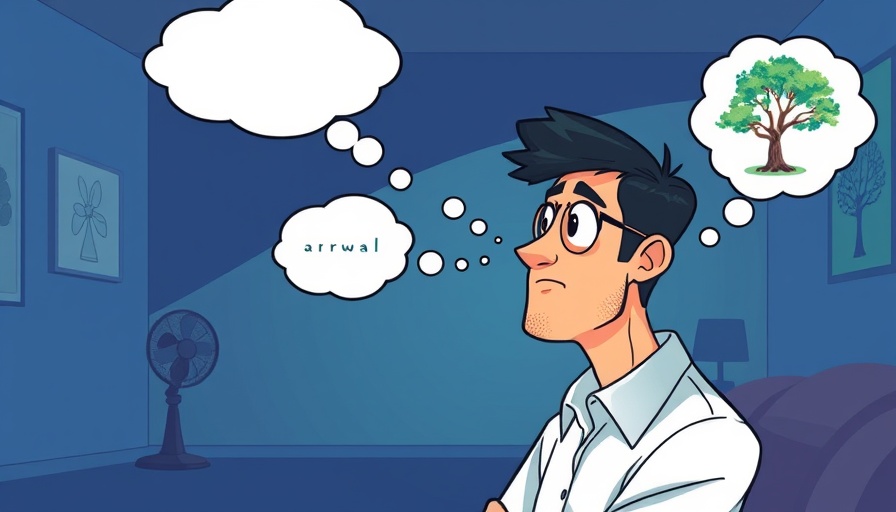
Understanding Nocturnal Lagophthalmos: The Basics
Nocturnal lagophthalmos is a condition that affects people's ability to fully close their eyes while they sleep. This can lead to discomfort during the day, with many individuals reporting symptoms like dry or irritated eyes upon waking. The inability to completely shut the eyelids at night can occur for various reasons, including facial nerve disorders, thyroid disease, genetics, and even changes from post-surgery recovery. It’s estimated that around 20% of individuals may experience this condition at some point in their lives.
Why Do Some People Sleep With Their Eyes Open?
Several factors contribute to why some people find themselves sleeping with their eyes partially open. According to research published in the National Library of Medicine, physical conditions such as facial nerve paralysis can play a significant role. Other potential causes include thyroid problems, congenital issues, or simply the aging process, which affects muscle control. Additionally, episodes of parasomnia—like sleepwalking or night terrors—can also manifest as sleeping with the eyes open, leading to further confusion regarding the underlying condition.
Signs and Symptoms of Nocturnal Lagophthalmos
Individuals suffering from nocturnal lagophthalmos may encounter various symptoms that can impact their daily lives. Waking up with discomfort, redness, or blurry vision are common indicators of this condition. You might also notice that your eyes feel unusually dry or heavy. It's essential to remain vigilant about these symptoms, as chronic exposure can lead to serious complications like corneal abrasions or infections.
The Risks Associated with Sleeping with Open Eyes
While many people might not initially consider sleeping with their eyes open to be a significant health risk, it can lead to substantial ocular complications. The cornea, which is the transparent layer covering the eye, relies on proper hydration to maintain clarity and function. When the eyelids remain partially open during sleep, the cornea is exposed to air, leading to dryness, irritation, and increased susceptibility to infections. Over time, these conditions can escalate, warranting medical intervention.
How Can You Tell if You’re Sleeping with Your Eyes Open?
If you suspect you might be sleeping with your eyes open, there are a few strategies to find out. You can ask a partner or use a video recording device to monitor your sleep patterns. Additionally, pay attention to your eyes' condition upon waking. If you frequently experience discomfort or visibility issues, it might be time to consult a healthcare professional.
Managing and Treating Nocturnal Lagophthalmos
There are several strategies for managing and treating nocturnal lagophthalmos effectively. In mild cases, lubricating eye drops or ointments may offer relief and protect the eyes throughout the night. For more severe instances, a healthcare provider might suggest using specially designed eye masks or tape to keep the eyelids closed while sleeping. If the underlying cause is a nerve disorder or other health issue, addressing that primary concern is crucial for successful management.
Can You Train Yourself to Sleep with Your Eyes Closed?
Training yourself to sleep with your eyes closed directly isn't typically feasible, but you can adopt practices that encourage better overall sleep health. Utilizing relaxation techniques before bed, such as meditation or gentle stretching, can enhance your likelihood of achieving restful sleep. Incorporating these habits not only supports better sleep but can help alleviate symptoms associated with nocturnal lagophthalmos.
Relaxation Techniques for Better Sleep
Incorporating relaxation strategies into your nightly routine can do wonders for sleep quality. Techniques such as deep breathing exercises, progressive muscle relaxation, or even gentle yoga can signal to your body that it's time to wind down. Consider implementing a consistent bedtime to improve your overall sleep patterns, as this can significantly impact your quality of rest.
Conclusion: The Importance of Awareness
Being aware of nocturnal lagophthalmos is vital for maintaining eye health and overall well-being. Symptoms can easily become mistaken for mere fatigue; however, recognizing and addressing this condition can prevent further complications. If you’re experiencing the signs, don’t hesitate to reach out to a healthcare provider for advice. Your eyes deserve the best care possible.
 Add Row
Add Row  Add
Add 




 Add Row
Add Row  Add
Add 


Write A Comment